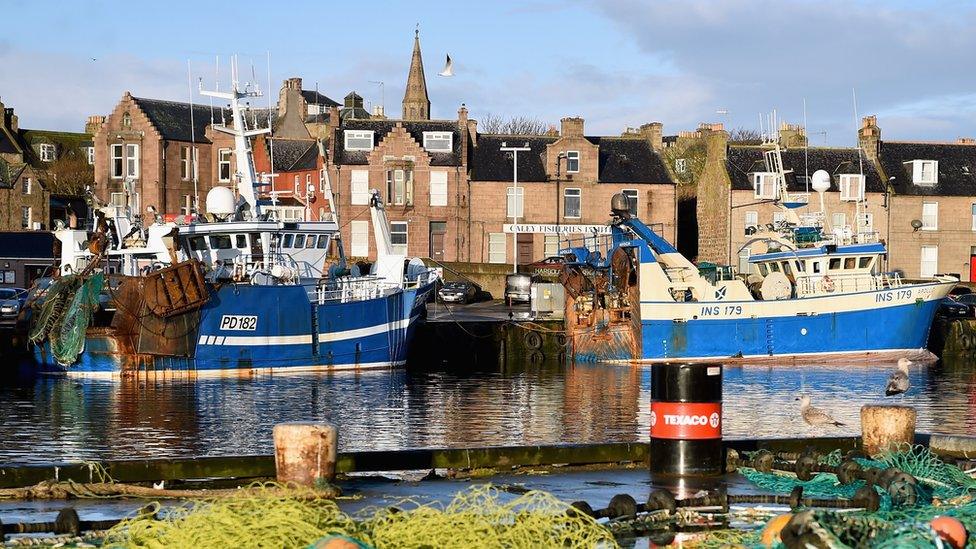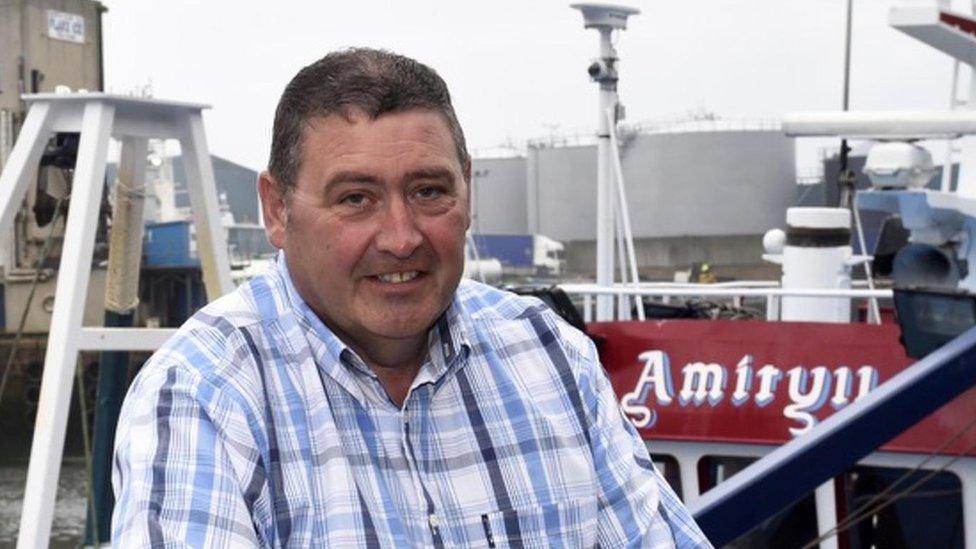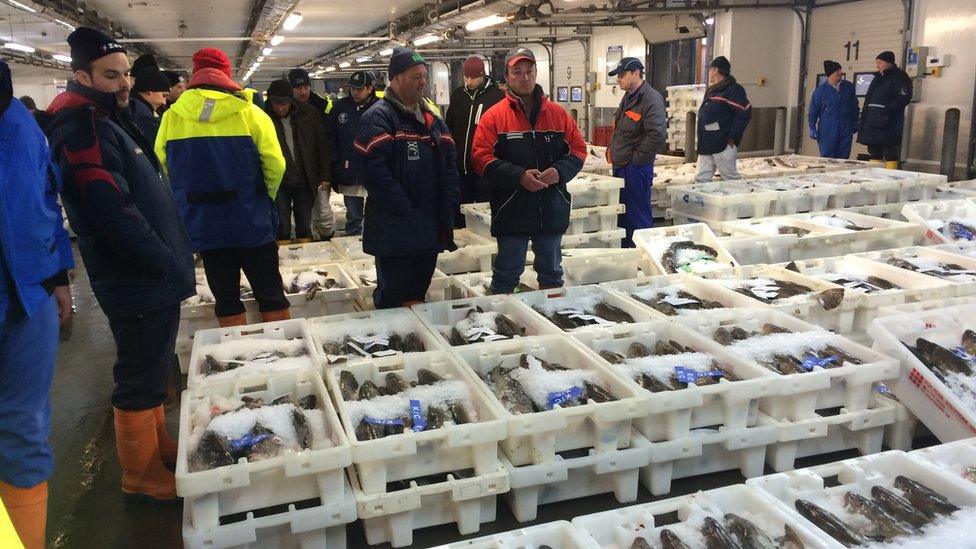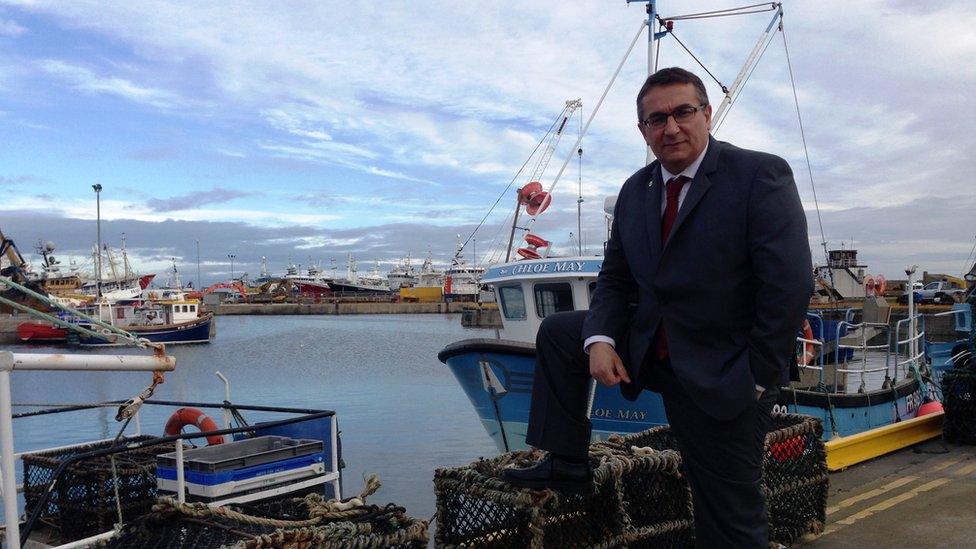Scotland's fishermen look forward to EU referendum
- Published

When it comes to the EU referendum, one industry where you'll find very strong views is fishing. Paul Moss went to the main Scottish fishing port of Peterhead to canvass opinion.
The man who sat down to join me in the Cross Keys pub had a furtive look. He ordered a coffee, I had tea - this was lunchtime, after all.
And then, with some embarrassment, Charles Buchan, a member of Aberdeenshire Council, explained to me why he supported Britain's membership of the European Union, and why in particular he thought it was good for the local fishing industry here in Peterhead.
"Fishermen are allowed to land their catches in Germany, in Denmark… we've got longstanding ties with Europe and it would be terrible to break them," he says.
Mr Buchan describes the various EU grants that have helped develop the harbours at Peterhead and nearby Fraserburgh, tens of millions of pounds worth, he says. Yet he readily acknowledges that his support for the European Union is not popular in the fishing community.
"It's a very, very difficult position."
A difficult position, and also a rare one. It took days of emails and phone calls to find just this one local man to put the In case for the forthcoming EU referendum.
The various organisations that represent fishermen are not taking an official line, but all told me they thought that the majority of their members would be voting to leave.
'Discard ban'
Jimmy Buchan's position is typical (he's no relation of Charles Buchan). He achieved national fame as the star of a BBC TV series, Trawlerman. When we meet on the dockside in Peterhead, he greets me with a cheerful grin, and friendly, avuncular manner. Yet he makes no attempt to hide his contempt for the regulations that the European Union enforces.
"From 2019, we can no longer dispose of any fish at sea - all fish we catch will have to be landed."

Jimmy Buchan says he's waited all his life for this referendum
This so-called "discard ban" will mean that fish caught by accident will be considered part of the quota that every fisherman is allotted, to limit how much fish they can remove from the sea.
"Unelected bureaucrats who sit in Brussels don't care about local communities," he complains. "I've waited all my life for this EU referendum. I'm voting for Out."
The discard ban and the quota system itself were brought in because of fears that European fish stocks were being depleted too fast. But the system has proved unpopular with many in the industry.

Fishing quotas
The European Commission sets total allowable catches (TACs) or catch limits (expressed in tonnes or numbers) for most commercial fish stocks
TACs are set annually for most stocks (every two years for deep-sea stocks) by the council of fisheries ministers
TACs are shared between EU countries in the form of national quotas. For each stock, a different allocation percentage per EU country is applied for the sharing-out of the quotas
EU countries can exchange quotas with other EU countries
EU countries have to use transparent and objective criteria when they distribute the national quota among their fishermen
EU countries are responsible for ensuring that their quotas are not overfished. When all the available quota of a species is fished, the EU country has to close the fishery
Source: European Commission, external

And those campaigning to leave the EU have recognised that the plight of fishermen can provide them with ammunition.
"Fishing will be central," says Mev Brown, a Scottish representative from the anti-EU campaign group, Business for Britain.

Peterhead has a bustling daily fish market
The fishing industry extends beyond the fishermen themselves, he points out. It includes processing plants and haulage companies. But more than that, Mr Brown believes that people care about fishing communities, and can be mobilised to vote Out if they believe these communities are threatened by EU membership.
"I'll be meeting people face to face," he says, "drumming up support. I may even get a day at sea on a trawler."
The debate about fisheries is a microcosm of the broader arguments around EU membership.
In campaigners point out that British fishermen currently sell most of their catch to other EU member countries. The Out side insist that a new trade agreement would be easy to negotiate.
'Difficult' job
But that suggestion is rejected by the Member of the Scottish Parliament representing the region around Peterhead. Christian Allard is certainly a noteworthy contributor to the EU debate, as he is the only MSP who actually comes from continental Europe - born and raised in the Burgundy region of France, he is now a proud member of the Scottish National Party.

Christian Allard knows he has a tough task ahead of him if he wants to convince Scotland's fisherman to vote to stay in the EU
Mr Allard fears that any deal negotiated by a post-EU Britain would be worse than the one fishermen currently have. And while he acknowledges that the current quotas have "sold the Scottish fishing industry down the river", he believes the answer is to stay in the EU and fight for a more just allocation.
"Once you are outside," he says, "you do not negotiate equal to equal."
I ask him whether he thinks he can win over Scotland's fishermen to his way of thinking.
"It will be very, very difficult," he acknowledges somewhat ruefully, saying he wishes he had more time before referendum day. "We might persuade them to change their minds. But I can understand if they won't."
For more on this story listen to Paul Moss's report on The World Tonight.